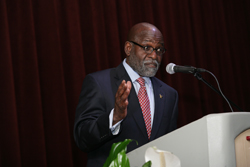NCCU Chancellor Calls for Agents of Change
 To those who might hope for someone with Martin Luther King Jr.’s stature and charisma to come along and lead the fight for justice, equality and economic fairness, Charlie Nelms offers this urgent advice: Stop waiting and get to work.
To those who might hope for someone with Martin Luther King Jr.’s stature and charisma to come along and lead the fight for justice, equality and economic fairness, Charlie Nelms offers this urgent advice: Stop waiting and get to work.
“All of us must take personal responsibility to fight for human rights and human survival,” the North Carolina Central University chancellor said, speaking at the university’s Martin Luther King Jr. Day Convocation on Thursday. “We cannot wait for someone else to take the lead.”
In his address to a standing-room audience in NCCU’s B.N. Duke Auditorium, Nelms urged students, faculty, staff and other members of the community “to reflect on how Dr. King and his work remain relevant in 2012.” And then he added, “Unfortunately, it’s not hard to do.”
Nelms repeatedly drew parallels between the challenges faced by King in the 1950s and 1960s and those of the present day.
“Instead of poll taxes or showing proof of property ownership to vote, we have new photo-ID requirements in 15 states and the list is growing,” he said. Such laws disproportionately affect the poor and the elderly, he noted, because many of them lack the most common form of photo ID, a driver’s license. And although many politicians claim that photo ID laws are needed to combat voter fraud, “No state has been able to document any significant evidence of voter fraud — and if there was any, they would have found it.”
The civil rights movement focused on equality of opportunity and equality under the law, Nelms said, but once the Civil Rights Act of 1964 and Voting Rights Act of 1965 had become law, King didn’t stop. “He moved beyond the lunch counter to address workers’ rights, unemployment, education, economic opportunity, healthcare and, especially, poverty.” His assassination in April 1968 occurred as he was organizing a new march on Washington for what he called the Poor People’s Campaign.
“Notice it was called the ‘Poor People’s Campaign’ — not the ‘Poor Black People’s Campaign,’ Nelms said. “This was what was so radical and dangerous. Thousands of poor black and white people were scheduled to march together to demand jobs, unemployment insurance, a fair minimum wage and education. Does this sound familiar to you? It should.”
Nelms exhorted the audience to become agents of change and emphasized the civil rights leaders’ persistence above all else. “In their pursuit of justice, King and the civil rights marchers did not let police dogs, nightsticks, fire hoses nor the fear of jail deter them in their march for justice. They persisted even in the face of death.”
“Finally,” he said, “never lose hope. Never, never, ever give up.”

